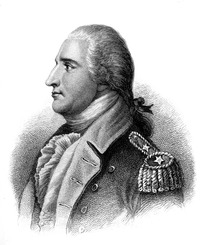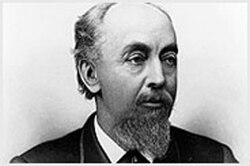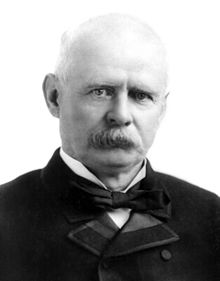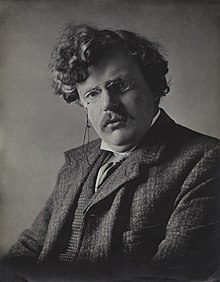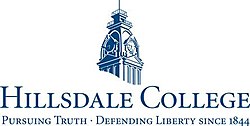June 14 is the 165th day of the year (166th in leap years) in the Gregorian calendar. There are 200 days remaining until the end of the year.
Holidays
- Christian feast day:
- Caomhán of Inisheer
- Elisha (Roman Catholic and Lutheran)
- Methodios I of Constantinople
- Richard Baxter (Church of England)
- June 14 (Eastern Orthodox liturgics)
- Commemoration of the Soviet Deportation related observances:
- Mourning and Commemoration Day or Leinapäev (Estonia)
- Mourning and Hope Day (Lithuania)
- Day of Memory for Repressed People (Armenia)
- Flag Day (United States)
- Freedom Day (Malawi)
- Liberation Day (Falkland Islands and South Georgia and the South Sandwich Islands)
- Women’s Day (Iraq)
- World Blood Donor Day (International observance)
History

In 767, Abū Ḥanīfa, Iraqi scholar (b. 699) dies in prison of unknown cause. He was the founder of the Sunni Hanafi school of fiqh (Islamic jurisprudence). He is also considered a renowned Islamic scholar and personality by Zaydi Shia Muslims He was often called “the Great Imam” (ألإمام الأعظم, al-imām al-aʿẓam).
He was born in the city of Kufa in Iraq, during the reign of the Umayyad caliph Abd al-Malik ibn Marwan. His father, Thabit bin Zuta, a trader, was 40 years old at the time of Abū Ḥanīfah’s birth.
His ancestry is generally accepted as being of Persian origin as suggested by the etymology of the names of his grandfather (Zuta) and great-grandfather (Mah). The historian Al-Khatib al-Baghdadi records a statement from Imām Abū Ḥanīfah’s grandson, Ismail bin Hammad, who gave Abū Ḥanīfah’s lineage as Thabit bin Numan bin Marzban and claiming to be of Persian origin.
In 1158, Munich is founded by Henry the Lion on the banks of the river Isar.
In 1216, First Barons’ War: Prince Louis of France captures the city of Winchester and soon conquers over half of the Kingdom of England.
In 1276, While taking exile in Fuzhou in southern China, away from the advancing Mongol invaders, the remnants of the Song Dynasty court hold the coronation ceremony for the young prince Zhao Shi, making him Emperor Duanzong of Song.
In 1285, Second Mongol invasion of Vietnam: Forces led by Prince Trần Quang Khải of the Trần Dynasty destroy most of the invading Mongol naval fleet in a battle at Chuong Duong.
In 1287, Kublai Khan defeats the force of Nayan and other traditionalist Borjigin princes in East Mongolia and Manchuria.
In 1381, Richard II of England meets leaders of Peasants’ Revolt on Blackheath. The Tower of London is stormed by rebels who enter without resistance.

In 1548, Carpentras, French composer (b. 1470) dies. He was a French composer of the Renaissance. He was famous during his lifetime, and was especially notable for his settings of the Lamentations which remained in the repertory of the Papal Choir throughout the 16th century. In addition, he was probably the most prominent Avignon musician since the time of the ars subtilior at the end of the 14th century.
In 1645, English Civil War: Battle of Naseby – 12,000 Royalist forces are beaten by 15,000 Parliamentarian soldiers.
In 1667, The Raid on the Medway by the Dutch fleet in the Second Anglo-Dutch War ends. It had lasted for five days and resulted in the worst ever defeat of the Royal Navy.
In 1775, American Revolutionary War: the Continental Army is established by the Continental Congress, marking the birth of the United States Army.
In 1777, The Stars and Stripes is adopted by Congress as the Flag of the United States.
In 1789, Mutiny on the Bounty: HMS Bounty mutiny survivors including Captain William Bligh and 18 others reach Timor after a nearly 7,400 km (4,600 mi) journey in an open boat.
In 1789, Whiskey distilled from maize is first produced by American clergyman the Rev Elijah Craig. It is named Bourbon because Rev Craig lived in Bourbon County, Kentucky.
In 1800, The French Army of First Consul Napoleon Bonaparte defeats the Austrians at the Battle of Marengo in Northern Italy and re-conquers Italy.
In 1801, Benedict Arnold, American general (b. 1741) dies in England. He was a general during the American Revolutionary War who originally fought for the American Continental Army but defected to the British Army. While a general on the American side, he obtained command of the fortifications at West Point, New York (future site of the U.S. Military Academy after 1802), overlooking the cliffs at the Hudson River (upriver from British- occupied New York City), and planned to surrender it to the British forces. After the plan was exposed in September 1780, he was commissioned into the British Army as a brigadier general. Born in Connecticut, Arnold was a merchant operating ships on the Atlantic Ocean when the war broke out in 1775. After joining the growing army outside Boston, he distinguished himself through acts of intelligence and bravery. His actions included the Capture of Fort Ticonderoga in 1775, defensive and delaying tactics despite losing the Battle of Valcour Island on Lake Champlain in 1776, the Battle of Ridgefield, Connecticut (after which he was promoted to major general), operations in relief of the Siege of Fort Stanwix, and key actions during the pivotal Battles of Saratoga in 1777, in which he suffered leg injuries that ended his combat career for several years. Despite Arnold’s successes, he was passed over for promotion by the Continental Congress while other officers claimed credit for some of his accomplishments. Adversaries in military and political circles brought charges of corruption or other malfeasance, but most often he was acquitted in formal inquiries. Congress investigated his accounts and found he was indebted to Congress after spending much of his own money on the war effort. Frustrated and bitter at this, as well the alliance with France and failure of Congress to accept Britain’s 1778 proposal to grant full self-governance in the colonies, Arnold decided to change sides and opened secret negotiations with the British. In July 1780, he was offered, continued to pursue and was awarded command of West Point. Arnold’s scheme to surrender the fort to the British was exposed when American forces captured British Major John André carrying papers that revealed the plot. Upon learning of André’s capture, Arnold fled down the Hudson River to the British sloop-of-war Vulture, narrowly avoiding capture by the forces of George Washington, who had been alerted to the plot.Arnold received a commission as a brigadier general in the British Army, an annual pension of £360, and a lump sum of over £6,000. He led British forces on raids in Virginia, and against New London and Groton, Connecticut, before the war effectively ended with the American victory at Yorktown. In the winter of 1782, Arnold moved to London with his second wife, Margaret “Peggy” Shippen Arnold. He was well received by King George III and the Tories, but frowned upon by the Whigs. In 1787, he returned to the merchant business with his sons Richard and Henry in Saint John, New Brunswick. He returned to London to settle permanently in 1791, where he died ten years later. Because of the way he changed sides, his name quickly became a byword in the United States for treason or betrayal. His conflicting legacy is recalled in the ambiguous nature of some of the memorials that have been placed in his honor.
In 1807, Emperor Napoleon‘s French Grande Armée defeats the Russian Army at the Battle of Friedland in Poland (modern Russian Kaliningrad Oblast) ending the War of the Fourth Coalition.
In 1821, Badi VII, king of Sennar, surrenders his throne and realm to Isma’il Pasha, general of the Ottoman Empire, ending the existence of that Sudanese kingdom.
In 1822, Charles Babbage proposes a difference engine in a paper to the Royal Astronomical Society entitled “Note on the application of machinery to the computation of astronomical and mathematical tables”.
In 1830, Beginning of the French colonization of Algeria: 34,000 French soldiers begin their invasion of Algiers, landing 27 kilometers west at Sidi Fredj.
In 1839, Henley Royal Regatta: the village of Henley-on-Thames, on the River Thames in Oxfordshire, stages its first regatta.
In 1846, Bear Flag Revolt begins – Anglo settlers in Sonoma, California, start a rebellion against Mexico and proclaim the California Republic.
In 1863, American Civil War: Second Battle of Winchester – a Union garrison is defeated by the Army of Northern Virginia in the Shenandoah Valley town of Winchester, Virginia.
In 1863, Second Assault on the Confederate works at the Siege of Port Hudson during the American Civil War.
In 1872, Trade unions are legalised in Canada.
In 1900, Hawaii becomes a United States territory.
In 1900, The Reichstag approves a second law that allows the expansion of the German navy.
In 1907, Norway grants women the right to vote.
In 1907, William Le Baron Jenney, American architect and engineer, designed the Home Insurance Building (b. 1832) dies. He was an American architect and engineer who is known for building the first skyscraper in 1884 and became known as the Father of the American skyscraper. Jenney is best known for designing the ten-story Home Insurance Building in Chicago. The building was the first fully metal-framed building, and is considered the first skyscraper. It was built from 1884 to 1885, enlarged in 1891, and demolished in 1931. In his designs, he used metal columns and beams, instead of stone and brick to support the building’s upper levels. The steel needed to support the Home Insurance Building weighed only one-third as much as a ten-story building made of heavy masonry. Using this method, the weight of the building was reduced, thus allowing the possibility to construct even taller structures. Later, he solved the problem of fireproof construction for tall buildings by using masonry, iron, and terra cotta flooring and partitions. In the years from 1889 to 1891, he displayed his system in the construction of the Second Leiter Building, also in Chicago. In 1998, Jenney was ranked number 89 in the book 1,000 Years, 1,000 People: Ranking the Men and Women Who Shaped the Millennium.
In 1914, Adlai Stevenson I, American politician, 23rd Vice President of the United States (b. 1835) dies. He served as the 23rd Vice President of the United States (1893–1897). Previously, he served as a Congressman from Illinois in the late 1870s and early 1880s. After his subsequent appointment as Assistant Postmaster General of the United States during Grover Cleveland‘s first administration (1885–1889), he fired many Republican postal workers and replaced them with Southern Democrats. This earned him the enmity of the Republican-controlled Congress, but made him a favorite as Grover Cleveland’s running mate in 1892, and he duly became 23rd Vice President of the United States. In office, he supported the free-silver lobby against the gold-standard men like Cleveland, but was praised for ruling in a dignified, non-partisan manner. In 1900, he ran for Vice President with William Jennings Bryan. Although unsuccessful, he was the first ex-Vice President ever to win re-nomination for that post with a different Presidential candidate. Stevenson was the grandfather of Adlai Stevenson II, a Governor of Illinois and the unsuccessful Democrat presidential candidate in both 1952 and 1956.
In 1919, John Alcock and Arthur Whitten Brown depart from St. John’s, Newfoundland on the first nonstop transatlantic flight.
In 1920, Max Weber, German sociologist and economist (b. 1864) dies after contracting the Spanish flu, he died of pneumonia. He was a German sociologist, philosopher, and political economist whose ideas influenced social theory, social research, and the entire discipline of sociology. Weber is often cited, with Émile Durkheim and Karl Marx, as among the three founding creators of sociology. Weber was a key proponent of methodological antipositivism, arguing for the study of social action through interpretive (rather than purely empiricist) means, based on understanding the purpose and meaning that individuals attach to their own actions. Weber’s main intellectual concern was understanding the processes of rationalisation, secularisation, and “disenchantment” that he associated with the rise of capitalism and modernity, and which he saw as the result of a new way of thinking about the world. Weber is best known for his thesis combining economic sociology and the sociology of religion, elaborated in his book The Protestant Ethic and the Spirit of Capitalism, in which he proposed that ascetic Protestantism was one of the major “elective affinities” associated with the rise in the Western world of market-driven capitalism and the rational-legal nation-state. Against Marx’s “historical materialism,” Weber emphasised the importance of cultural influences embedded in religion as a means for understanding the genesis of capitalism. The Protestant Ethic formed the earliest part in Weber’s broader investigations into world religion: he would go on to examine the religions of China, the religions of India and ancient Judaism, with particular regard to the apparent non-development of capitalism in the corresponding societies, as well as to their differing forms of social stratification.
In 1926, Brazil leaves the League of Nations
In 1936, G. K. Chesterton, English author, poet, and playwright (b. 1874) dies of congestive heart failure on the morning of 14 June 1936, at his home in Beaconsfield, Buckinghamshire. His last known words were a greeting spoken to his wife. He better known as G.K. Chesterton, was an English writer, lay theologian, poet, philosopher, dramatist, journalist, orator, literary and art critic, biographer, and Christian apologist. Chesterton is often referred to as the “prince of paradox.” Time magazine, in a review of a biography of Chesterton, observed of his writing style: “Whenever possible Chesterton made his points with popular sayings, proverbs, allegories—first carefully turning them inside out.” Chesterton is well known for his fictional priest-detective Father Brown, and for his reasoned apologetics. Even some of those who disagree with him have recognized the universal appeal of such works as Orthodoxy and The Everlasting Man. Chesterton, as a political thinker, cast aspersions on both Progressivism and Conservatism, saying, “The whole modern world has divided itself into Conservatives and Progressives. The business of Progressives is to go on making mistakes. The business of the Conservatives is to prevent the mistakes from being corrected.” Chesterton routinely referred to himself as an “orthodox” Christian, and came to identify this position more and more with Catholicism, eventually converting to Roman Catholicism from High Church Anglicanism. George Bernard Shaw, Chesterton’s “friendly enemy” according to Time, said of him, “He was a man of colossal genius.” Biographers have identified him as a successor to such Victorian authors as Matthew Arnold, Thomas Carlyle, John Henry Cardinal Newman, and John Ruskin.
In 1937, Pennsylvania becomes the first (and only) state of the United States to celebrate Flag Day officially as a state holiday.
In 1937, U.S. House of Representatives passes the Marihuana Tax Act.
In 1940, World War II: Paris falls under German occupation, and Allied forces retreat.
In 1940, The Soviet Union presents an ultimatum to Lithuania resulting in Lithuanian loss of independence.
In 1940, A group of 728 Polish political prisoners from Tarnów become the first residents of the Auschwitz concentration camp.
In 1941, June deportation: the first major wave of Soviet mass deportations and murder of Estonians, Latvians and Lithuanians, begins.
In 1944, World War II: After several failed attempts, the British Army abandons Operation Perch, its plan to capture the German-occupied town of Caen.
In 1945, World War II: Filipino troops of the 15th, 66th and 121st Infantry Regiment, Philippine Commonwealth Army, USAFIP-NL liberate the captured in Ilocos Sur and start the Battle of Bessang Pass in Northern Luzon.
In 1949, Albert II, a rhesus monkey, rides a V2 rocket to an altitude of 134 km (83 mi), thereby becoming the first monkey in space.
In 1951, UNIVAC I is dedicated by the U.S. Census Bureau.
In 1952, The keel is laid for the nuclear submarine USS Nautilus.
In 1954, U.S. President Dwight D. Eisenhower signs a bill into law that places the words “under God” into the United States Pledge of Allegiance.
In 1955, Chile becomes a signatory to the Buenos Aires copyright treaty.
In 1959, Disneyland Monorail System, the first daily operating monorail system in the Western Hemisphere, opens to the public in Anaheim, California.
In 1959, A group of Dominican exiles depart from Cuba and land in the Dominican Republic with the intent of overthrowing the totalitarian government of Rafael Trujillo. All but four are killed or executed.
In 1962, The European Space Research Organisation is established in Paris – later becoming the European Space Agency.
In 1966, The Vatican announces the abolition of the Index Librorum Prohibitorum (“index of prohibited books”), which was originally instituted in 1557.
In 1967, Mariner program: Mariner 5 is launched towards Venus.
In 1967, The People’s Republic of China tests its first hydrogen bomb.
In 1982, Falklands War: Argentine forces in the capital Stanley conditionally surrender to British forces.
In 1985, TWA Flight 847 is hijacked by Lebanese Islamist organization Hezbollah shortly after take-off from Athens, Greece.

In 1986, Alan Jay Lerner, American composer (b. 1918) died of lung cancer in Manhattan at the age of 67. At the time of his death he was married to actress Liz Robertson, who was 36 years his junior. He was an American lyricist and librettist. In collaboration with Frederick Loewe, and later Burton Lane, he created some of the world’s most popular and enduring works of musical theatre for both the stage and on film. He won three Tony Awards and three Academy Awards, among other honors.
In 1994, The 1994 Stanley Cup riot occurs after the New York Rangers win the Stanley Cup from Vancouver, causing an estimated CA$1.1 million, leading to 200 arrests and injuries.
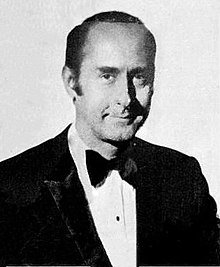
In 1994, Henry Mancini, American composer and conductor (b. 1924) dies of pancreatic cancer in Los Angeles on June 14, 1994. He was working at the time on the Broadway stage version of Victor/Victoria, which he never saw on stage. Mancini was survived by his wife of 43 years, singer Virginia “Ginny” O’Connor, with whom he had three children. They had met while both were members of the Tex Beneke orchestra, just after World War II. He was an American composer, conductor and arranger, who is best remembered for his film and television scores. Often cited as one of the greatest composers in the history of film, he won four Academy Awards, a Golden Globe, and ten Grammy Awards, plus a posthumous Grammy Lifetime Achievement Award in 1995. His best-known works include the jazz-idiom theme to The Pink Panther film series (“The Pink Panther Theme“) and the theme to the Peter Gunn television series, the latter of which won the first ever Grammy Award for Album of the Year. Mancini had a long collaboration with the film director Blake Edwards.
In 2002, Near-Earth asteroid 2002 MN misses the Earth by 75,000 miles (121,000 km), about one-third of the distance between the Earth and the Moon.

In 2009, Bob Bogle, American guitarist (The Ventures) (b. 1934) dies at the age 75 on June 14, 2009 from non-Hodgkin’s lymphoma in Vancouver, Washington. He was a founding member of the instrumental combo The Ventures. He and Don Wilson founded the group in 1958. Bogle was the lead guitarist and later bassist of the group. In 2008, Bogle and other members of The Ventures were inducted into the Rock and Roll Hall of Fame in the Performer category.
Born near Wagoner, Oklahoma, Bogle worked as a bricklayer in California from the age of 15. A self-taught guitar player, Bogle met Don Wilson in Seattle in 1958, where they worked together on construction sites. They went on to form a band, The Versatones, which evolved into The Ventures. Bogle’s lead guitar on the Ventures’ 1960 cover of “Walk, Don’t Run” helped to influence the next generation of guitarists including John Fogerty, Steve Miller, Joe Walsh and Stevie Ray Vaughan. Bogle’s use of the vibrato arm was particularly notable.
In 2014, A Ukraine military Ilyushin Il-76 airlifter is shot down, killing all 49 people on board.
In 2015, A wildfire near Willow, Alaska in the Matanuska-Susitna Borough burns over 6,500 acres.
In 2016, An alligator dragged a 2-year-old Nebraska boy into the water as his father tried desperately to save him at Disney’s Grand Floridian Resort & Spa near Orlando.
In 2016, Russian government hackers got into the Democratic National Committee’s computer system and gained access to opposition research on Donald Trump, the presumptive Republican presidential nominee, according to DNC officials and security experts. The FBI notified the DNC of the hack, which was so thorough that the intruders were able to see all email and chat traffic. Russian spies also targeted the networks of Trump, presumptive Democratic nominee Hillary Clinton, and several GOP political action committees.
In 2017, London: A fire in a high-rise apartment building in North Kensington leaves 72 people dead and another 74 injured.
In 2017, In Alexandria, Virginia, Republican member of Congress and House Majority Whip Steve Scalise of Louisiana is shot while practicing for charity baseball.

